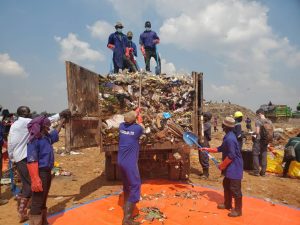In recent years, the Kampala Capital City Authority (KCCA) has put in place several incentives to manage solid waste in the city. “Since 2016, we the Kampala Capital City Authority have developed bankable projects with the Ministry of Energy and Mineral Development on Waste to Resource. It is time we walked the talk,” the Kampala Capital City Lord Mayor Hon. Erias Lukwago said addressing mayors during a high-level discourse about the yet to be developed Solid Waste Management Strategy.
During his address on 1st December 2021 in Kampala, the Lord Mayor revealed that in Kampala only about 28,000 tons of waste is collected and delivered to a landfill every month. KCCA records show that this represents approximately 56 percent of the waste generated in the city. The remaining uncollected waste is normally dumped in unauthorized sites, causing health and environmental problems.
The Lord Mayor went on to mention that as climate change continues to impact the countryside, the cities and municipalities too are strained for resources. The rapid expansion of cities is also threatening the environment through unsustainable settlement patterns, inefficient resource use and unsustainable transport modes. Our cities are therefore part of the problem and part of the solution. Indeed, Kampala city has a key role to play by taking a lead in planning, guiding and managing emissions reduction. Kampala should lead in sustainable and innovative solutions for adaptation and enhanced resilience that can be replicated in other municipalities. It is during this address that he handed over the Kampala Climate Change Action Strategy, a key instrument that is in place to help mainstream climate change response in all the city services.

The Lord Mayor hands over the Kampala City Climate Change Action Plan to Dr. Ronald McGill the EU Project Lead
The GKMA faces significant challenges in managing its waste. A combination of public and private waste management services collects about 60 percent of the total waste generation in the Greater Kampala Metropolitan Area (GKMA). The Kiteezi landfill, the only designated landfill site within GKMA, has already exceeded its capacity and needs to be closed and capped. KCCA has already purchased land for developing a new landfill at Ddundu, located in Kyampisi Sub- County, Mukono District.
In line with the Government of Uganda’s Vision 2040 and the Uganda Green Growth Development Strategy (UGGDS), the Global Green Growth Institute (GGGI) has partnered with the European Union (EU) to deliver the Greening Uganda’s Urbanization and Industrialization project. In response to outcome three of this project (Efficient and effective solid waste management is pursued and demonstrated), the Cardno-led consortium was commissioned by GGGI to provide consultancy services for the development of a technical feasibility study, design two waste diversion centres in the GKMA and also, develop the GKMA solid waste management strategy.

Solid Waste Management Survey during the Feasibility Study in the GKMA
This Kampala Waste Management Project intends to overhaul the entire SWM system, from collection to disposal, as well as secure the closure of Kiteezi. In its recent attempts to handle the solid waste management challenge, KCCA has tendered a joint concession for the existing Kiteezi Landfill and a future waste disposal site. It has made available the necessary land for a new site for continued disposal after the end of the life of the Kiteezi site, identified and made available a site for a transfer station (possibly at the existing Kiteezi site), and ensured that all waste collected in Kampala is directed to the designated disposal facilities (as a condition of all collection licenses issued).
To protect human health and the environment, solid waste should be collected, processed and properly disposed of. But solid waste contains valuable resources that can be recovered and used productively. With the appropriate policies, incentives and technologies, solid waste can become a valuable resource.
Already, KCCA has purchased 135 acres of land (at Ddundu). Here, waste treatment will be designed, built, operated, and maintained as a sanitary landfill and waste treatment facility in compliance with Ugandan and international standards.
The recently concluded COP26 was powerful. Partner states made statements and commitments to ensure that the Paris commitments are translated into action. “We are still dealing with open onsite faculation for example in Nakawa no fecal sludge line is laid. Only eight percent of Kampala residents are connected to the sewer line,” said Paul Mugambe the Mayor Nakawa Division.
Political support and goodwill are very important if we are to successfully implement these impactful strategies for the better of our communities said Dr. Ronald McGill, the Project Lead of the Greening of Uganda’s Urbanisation and Industrialisation project. It is very important that the leaders rally this agenda if the story is to change in the coming years.
Giving closing remarks, Mrs. Regina Bakitte, Her Worship of Nansana municipality added to the Lord Mayor’s voice in advocating for resources and pledging support to GGGI and Cardno. She thanked the two teams for this engagement and looked forward to the development of the Solid Waste Management System and its full implementation.